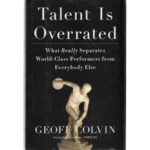LISTEN NOW
Outline: Talent Is Overrated by Geoff Colvin
Outline
Expand to Read ...
I. Introduction
- Main Argument: Talent, often seen as innate and unchangeable, is not the primary factor behind exceptional performance.
- Key Points:
- Belief in talent lacks empirical support.
- Overemphasis on talent can discourage effort, while belief in improvement through effort fosters excellence.
- Focus: Colvin attributes exceptional performance to deliberate practice, not innate talent.
II. Why Talent Alone Fails to Explain Excellence
- Empirical Gaps:
- No strong evidence for innate talent as a determinant of high achievement.
- High performers rarely display exceptional ability without formal training or early encouragement.
- Key Insights:
- Excellence correlates with extensive hours of deliberate practice.
- Few people achieve excellence due to the time and effort required.
III. What Is Deliberate Practice?
- Definition: Deliberate practice targets weaknesses through focused effort, enabling continuous improvement.
- Key Features:
- Identifying specific areas for improvement.
- Sustained effort to refine performance.
- Comparison:
- Beginners engage in deliberate practice early but often stop after reaching proficiency.
- Top performers sustain deliberate practice to reach mastery.
- Example:
- Swimmers refine strokes and positions continuously to improve speed, while average swimmers plateau at muscle-memory proficiency.
IV. Benefits of Deliberate Practice
- Understanding Your Domain:
- Deliberate practice deepens knowledge of patterns and principles.
- Enables error reduction and performance optimization.
- Example:
- A swimmer learns that streamlined body positions enhance speed and applies this principle broadly to refine technique.
- Time Commitment:
- Immediate benefits are possible, but excellence typically requires about 10 years of sustained practice.
- Progress is limited to 4-5 hours per day due to the mental demands of concentrated effort.
- Historical Example:
- Mozart’s “rapid” success stemmed from nearly 20 years of practice by the time he gained recognition.
V. How to Engage in Deliberate Practice
- Direct Practice:
- Definition: Skill refinement in a controlled environment.
- Use Case: Ideal for skills not frequently used in daily life.
- Example:
- A CEO practices negotiation scenarios with colleagues to prepare for rare but crucial supplier meetings.
- Steps:
- Identify weaknesses.
- Design exercises targeting those weaknesses.
- Simulate realistic scenarios to build proficiency.
- Indirect Practice:
- Definition: Skill development within real-life tasks.
- Use Case: Ideal for frequently used skills, such as job-related tasks.
- Steps:
- Identify Weak Points:
- Focus on one skill at a time to ensure measurable progress.
- Example: A manager may choose to improve clarity in feedback delivery.
- Create an Improvement Plan:
- Set specific, actionable goals for addressing the weak point.
- Example: Spend five minutes elaborating on each feedback point with examples.
- Analyze Performance:
- Compare with benchmarks or peers to identify improvement areas.
- Example: Observe how a skilled manager structures feedback.
- Adjust and Repeat:
- Refine the plan based on results and continue the cycle.
- Example: Limit feedback points to allow for more in-depth discussion.
- Identify Weak Points:
VI. Sustaining Deliberate Practice
- Intrinsic Motivation:
- Excellence requires internal drive, not external rewards alone.
- Intrinsic motivation is linked to:
- A deep desire for achievement.
- A belief that effort, not talent, drives success.
- Mindset:
- A “training mindset” reinforces belief in improvement through practice.
VII. Key Takeaways
- Excellence Is Earned:
- Talent plays a minimal role compared to deliberate, sustained effort.
- Practice Wisely:
- Focus on deliberate practice, targeting weaknesses systematically.
- Commit Long-Term:
- Achieving world-class performance takes years of consistent, focused practice.
- Adopt the Right Mindset:
- Believe in the power of effort over innate ability to stay motivated and achieve your goals.

 Buy on Amazon
Buy on Amazon